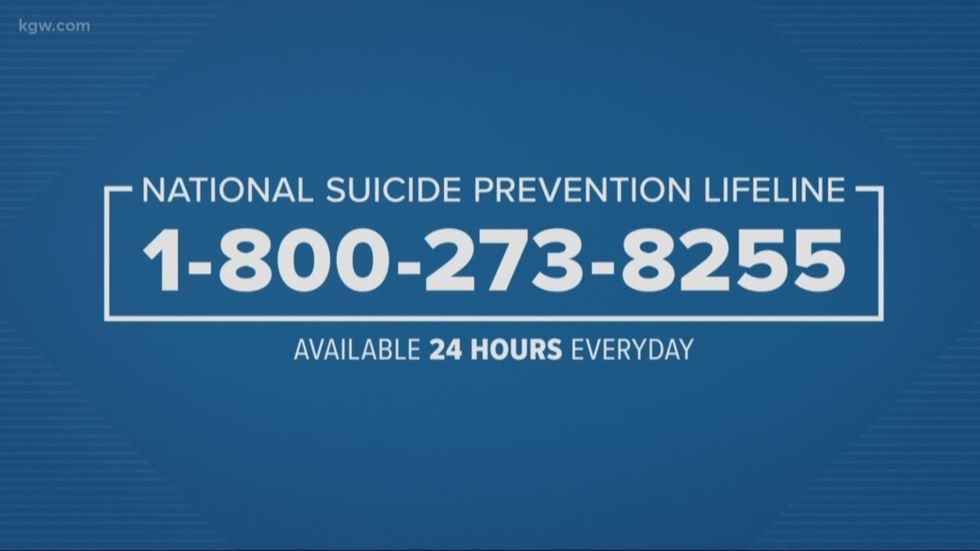I didn't have my first real suicidal thought until I attended college (an entirely different university than Purdue). I had the same thoughts during puberty that most people do as their body changes and as middle school girls get mean, that maybe life would be better if I wasn't alive, but genuinely hadn't considered ending my own life until I was in college. I had ended up in a situation that I wasn't happy with, ended up at a school that was slowly draining me of my energy, my interests, my joy, and my will to remain alive. Mental health has such a stigma, and the concept of attempting suicide, considering suicide, and ending one's own life has such a worse stigma. I have been through this, and have been successful in largely eliminating these thoughts from my daily mental language. I've been lucky, I've had crazy support through this, people who cared so much to make sure that even when I was struggling, they wouldn't let me give in to the thoughts that dominated my brain.
My suicidal thoughts are not a ploy for attention.
The attention I received when I reached out for help was beneficial and was from people I trusted to help me with my mental state. A large majority of those with suicidal thoughts do not bring attention to their thoughts, but rather exist in a state of public denial as it takes astronomical amounts of trust to share the darkness with others. Most people struggling with suicidal thoughts have practice hiding it. My thoughts are not me crying out for attention, my thoughts are generally my own.
Telling me how much others would hurt if I ended my life is toxic positivity.
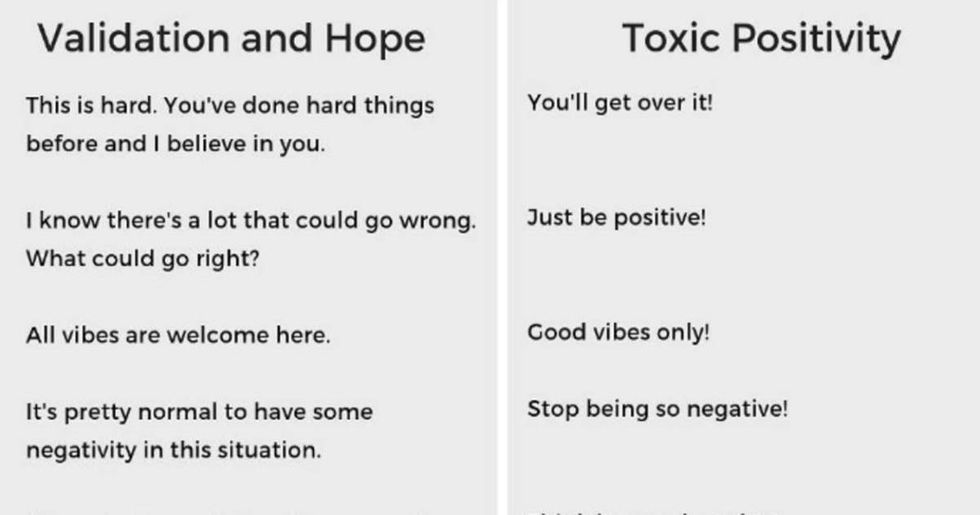
Toxic positivity is defined as being positive while simultaneously invalidating the thoughts of the person sharing with you. By reminding someone that the fact that someone cares about them instead of listening to them explain their thoughts and explain while they are experiencing their thoughts, you invalidate their experience. It also introduces a level of guilt into the conversation, often encouraging a follow up thought, that the desires of the person struggling with these thoughts are less valid and less important than that of others who would suffer later. This statement suggests that the suffering of a person with suicidal thoughts does not matter, but rather the suffering of others is something they should consider when they are struggling. While it is amazing most of the time to hear that someone cares about you, hearing that when you are at one of your lowest points serves as a hindrance to healing.
My suicidal thoughts are not going to be fixed by a "Look on the bright side".
When someone is struggling with suicidal thoughts, it is unlikely that a cliche will bring them out of the darkness. Suicidal thoughts are not fixed by a positive outlook. Often thoughts manifest even at a point of joy or happiness. You can't fix this struggle with a little optimism.
My suicidal thoughts are not the same as someone else's.
Not everyone struggles from suicidal thoughts in the same way. Some face these thoughts in silence every day. Some face these thoughts at random times, in a way that the thoughts disrupt the day and there is no way to avoid them. Some struggle with suicidal thoughts in silence on their own, and others have a support system that knows how they suffer. Some consider ending their life immediately, others just wish they could die but don't want to take the actions to end their lives. Suicidal thoughts manifest in so many different ways and through many different means. My thoughts were not the same as another's and therefore I cannot pass judgement on their thoughts (nor should you anyways). I can support them but I know that I may not be able to understand their thoughts.
Sometimes we wish you could see the signs.
The signs aren't always obvious, yet I often felt like everyone could tell that I wasn't happy. However, even when you ask me if I am okay, I might lie to you, even if I wish you could see the signs.
I am afraid of bothering you with my thoughts.
One of the best things I have ever heard is that I wasn't bothering someone by sharing with my thoughts with them. I didn't want to be a bother to someone, and I often refused to share my thoughts with others. Even when I wanted to talk to you, I wouldn't because I was so afraid you would think I was too much to handle.
Struggling with suicidal thoughts does not mean I intend to commit suicide.

I, even now, experience suicidal thoughts long after I considered actually suicide. I very rarely considered ending my life via suicide and now I have accepted that these thoughts might always plague my mind without ever considering the action.
It's not just women suffering with these thoughts.
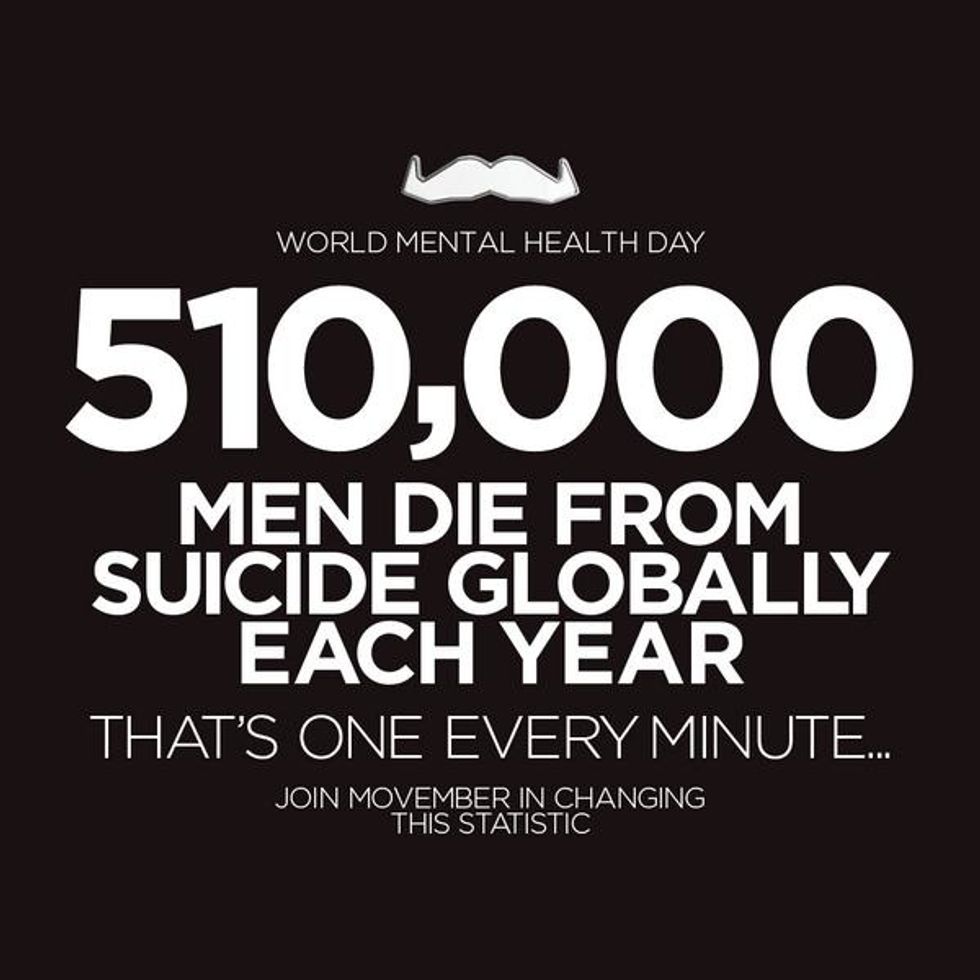
Men end their lives via suicide more than women, yet men are often the least likely to be heard by support group. Stand alongside the men in your life. I know what it's like to be alone in this situation. Take care of these men, and listen to them.
I'm not just in a bad mood.
While I often found that in my case, my thoughts were brought on by bad days, I was never just in a bad mood when I was contemplating whether things would be better if I ended my life. I wasn't just grumpy. It absolutely was not appropriate for you to ask me if it was my time of the month (that's a different conversation). I was never just in a bad mood, I was often at the lowest point I could reach.
Please don't tell me not to have these thoughts.
I can't control them, because if I could, I would gladly give up thinking of how much better life would be if I wasn't in it. Please don't police my thoughts. Do not blame the person struggling with these thoughts. They are most definitely involuntary, and support means more than regulation.
Please stop making jokes about killing yourself.

Even I occasionally say in jest that I wish I was dead, because honestly that is the world we live in. Every time that those words come out of my mouth, I regret suggesting that because I know firsthand that these thoughts are no joke. My life was significantly worse because of these, my decisions changed, my personality changed. It isn't a joke, and the fact that it is often viewed as a joke causes many struggling to wonder if they can trust those around them with the truth.
Let's talk about media.

Media often portrays suicidal actions and suicidal thoughts as a clear indicator that a character they want to add "depth" to is suffering from a mental illness. Shows that surround themselves on this value, that people would rather be dead, and show the other characters suffering do not paint a clear picture. I imagine by now, you have heard of 13 Reasons Why, a book turned TV series. Take it from me, that show paints suicide in a better light than it is, glorifies it, encourages ending your life when no one is listening. Many people, especially young people, find their role models in media. By glorifying suicide, many people might accept these thoguths and choose to end their lives via suicide instead of embracing their support system and getting help.
Don't blame yourself.
My suicidal thoughts were rarely (if ever) brought on by someone specific. It was rather a collection of bad things that weighed on me and lasted over days that encouraged these thoughts in my head. It was feeling that I was at my lowest point. Blaming yourself makes you part of the problem. Be supportive. You are not the victim because I am struggling.
We are not weak.
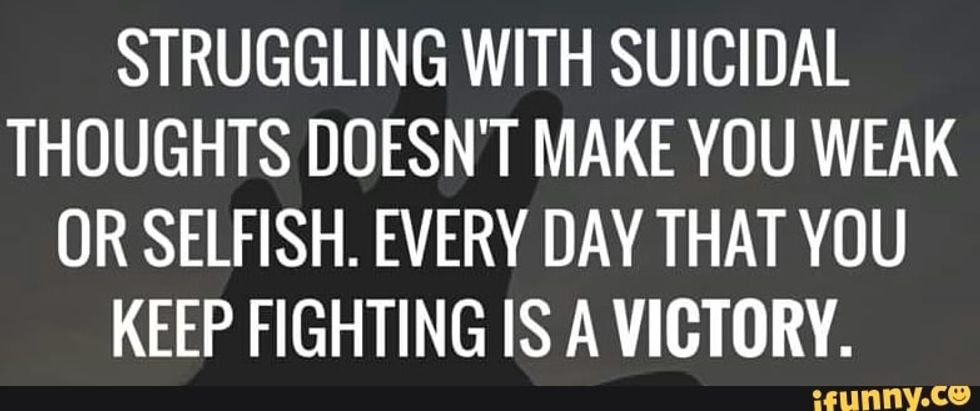
These thoughts that plague our minds do not make us weaker than someone who has never struggled with suicidal thoughts. In fact, we are strong, because often we are forced to go on living our day as normal because people have associated a stigma with mental illness. We often hide our thoughts and put on a brave face. We are not weak.
Always check on your strong friend.
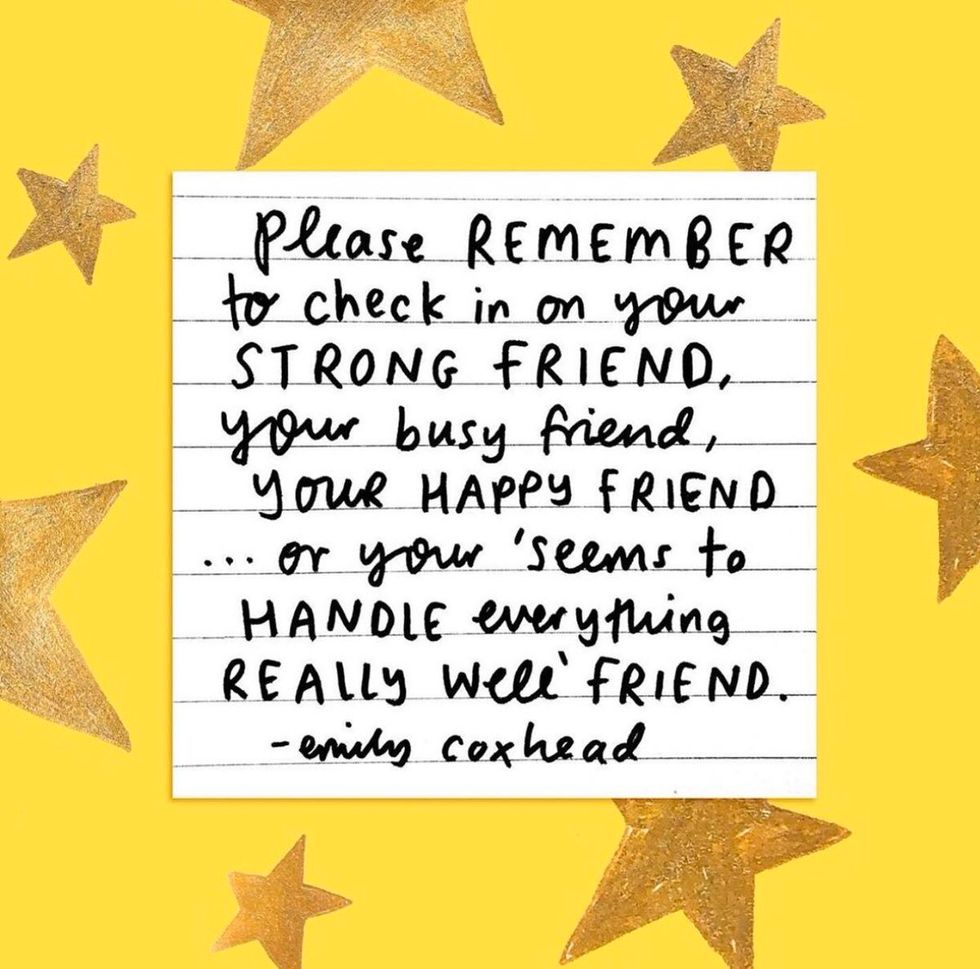
When I was struggling with suicidal thoughts, I was also helping someone else through their struggles. Many people didn't know I was struggling because I was so busy focusing on other people. No one thought to check on me because I was busy checking on other people. Sometimes the seemingly put together and strongest people have the darkest thoughts.
If you are reading this and you yourself are struggling with suicidal thoughts, please consider getting help. I myself, have only recently looked into getting help, and have struggled for four years with these invasive thoughts. I won't tell you that you need help, only suggest that getting help might prove to be beneficial in the long run. Stay strong.
If you are struggling with suicidal thoughts, call 1-800-273-8255.


